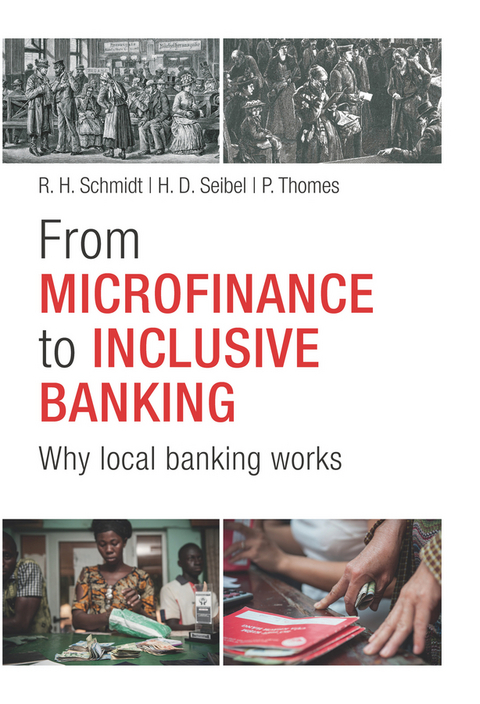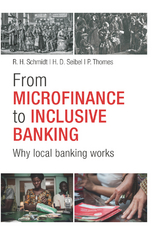From Microfinance to Inclusive Banking
Once praised as a panacea to overcome poverty microfinance has had to face harsh criticism because of painful failures and unfulfilled expectations. Still many people in particular in rural regions do not have any access to formal financial services, many microfinance institutions are weak, and others rather exploit their clients driving them into over indebtedness than helping them out of poverty. What should microfinance achieve? Can it help to build up inclusive financial systems allowing access to basic financial services for everybody?
The historic templates for this book are the German Sparkassen and Cooperative banks that have a strong track record of development and growth spanning over 200 years. For obvious reasons their results cannot be transferred directly into specific solution options to today's challenges in developing countries. Nevertheless the coming into existence of Sparkassen and Cooperative banks can well be seen as part of a period of revolutionary developments in the European economic and social landscape, which can be viewed as analogous to the transformation that emerging economies are undergoing today. While Europe faced dramatically changing living conditions during the period of industrialization these newly creatd banks made change possible by unequivocally including the lower class population in the transformationby providing access to savings and loans. And it is this is parallel - even in the face of the many differences - which is why their development and success deserves careful consideration today.
The authors' approach differsfrom other explorations by specifically adopting an interdisciplinary strategy. They take into account past developments as well as current global ones from a historical, social science and economic point of view. Analysis and the interpretation of data is supported by case studies to illustrate their considerations. The authors identify general parameters both for failure and for success and also indicate how to optimize existing potentials - both for institutions and policy makers.
As a result of this interdisciplinary work the authors advance an inclusive stylised facts based model. The will to build up institutions, to adhere to corporate social responsibility and creating conducive legal frameworks form the basic conditions for success. More specifically, the guiding principles of these successful business models are a fair savings and credit policy, the promotion of capital transfers without reference to class and gender, a focus on business activities in a well defined region, decentralized organizational structures combined with national networks which avoid regional capital drains and the securing of economies of scale and scope. Llast but not least is the centrality of objectives beyond that of the sheer maximisation of profits.
Reinhard H. Schmidt is a professor of finance at Goethe University in Frankfurt. He has 30 years of experience as a consultant in development finance for various national and international organizations, has been the chairman of the supervisory board of one of the world's largest microfinance support institutions for five years and has published extensively on microfinance and development finance issues. In all these capacities he has strongly influenced the recent development of modern microfinance. Hans Dieter Seibel is a professor emeritus at Cologne University and a board member of the European Microfinance Platform. He has also taught at the Universities of Monrovia, Princeton NJ and Dortmund. In 1988-91 he was team leader of Linking Banks and Self-Help Groups in Indonesia, a joint project of GIZ and the central bank of Indonesia, which has also served as a model for SHG banking programs in India, the Philippines, Thailand and other countries. In 1999-2001 he was Rural Finance Advisor at the International Fund for Agricultural Development, a UN agency in Rome, and author of its Rural Finance Policy. Paul Thomes is Professor of Economic and Social History and History of Technology at the School of Business and Economics of RWTH Aachen University. He studied English, history, and economics at the Universities of Saarbrücken in Germany and Edinburgh in the UK. He received a doctoral degree in 1984, following his dissertation on the history of the Prussian savings banks, and a post-doctoral habilitation degree in 1992, following his work on the economy of the early modern town.
| Erscheint lt. Verlag | 10.8.2016 |
|---|---|
| Verlagsort | Berlin |
| Sprache | englisch |
| Maße | 170 x 240 mm |
| Gewicht | 766 g |
| Einbandart | gebunden |
| Themenwelt | Wirtschaft ► Betriebswirtschaft / Management ► Finanzierung |
| Betriebswirtschaft / Management ► Spezielle Betriebswirtschaftslehre ► Bankbetriebslehre | |
| Schlagworte | Bankwirtschaft • Finance & Investments • Finance & Investments Special Topics • Finanz- u. Anlagewesen • Finanzwesen • Microfinance • Netzwerke (Wirtschaft) • Spezialthemen Finanz- u. Anlagewesen |
| ISBN-10 | 3-527-50802-3 / 3527508023 |
| ISBN-13 | 978-3-527-50802-0 / 9783527508020 |
| Zustand | Neuware |
| Haben Sie eine Frage zum Produkt? |
aus dem Bereich




